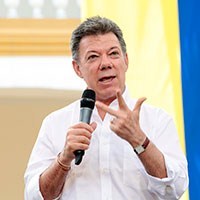Colombians re-elected President Juan Manuel Santos for a second term on June 15, in what is being described as a referendum on his government’s peace negotiations to end the half-century-long guerrilla war with the FARC. The election was close until the very end, with pre-election polls predicting differing results. In the end, Santos won a little more than 50 percent of the votes while his challenger, former Finance Minister Oscar Ivan Zuluaga, gained a little over 45 percent, providing a close yet nonetheless decisive mandate for the incumbent president to continue with the peace process. With this in mind, some observers are already predicting that negotiations will successfully conclude by the end of this year or shortly thereafter, and have begun to look ahead toward implementation of the peace accords.
But that’s not necessarily the actual message of the election, either in terms of the peace negotiations or in terms of the rest of the Colombia’s domestic and international agenda.
Up until the end of 2013, Santos appeared to be coasting to a likely second term. He was the favorite among five major candidates, with the highest name recognition and the best electoral machinery. He was nonetheless forced to contest a runoff after finishing second to Zuluaga in first-round voting on May 25. In part, this was because Santos lost votes to the leftist candidates by not making more progress on the social development promises of his first term. But his first-round loss to Zuluaga, a relative unknown tied closely to former President Alvaro Uribe, was due more to anxiety among the Colombian people that Santos was willing to give away too much in terms of impunity for the guerrillas and other concessions in order to win peace. Though Santos served as Uribe’s defense minister at a time when the Colombian government focused on militarily defeating the FARC, he has been the target of Uribe’s blistering criticism since adopting a more conciliatory posture toward resolving the conflict. The tightness of the race underscores the fact that, while Colombians sincerely seek peace, they are unwilling to support peace at any cost.

